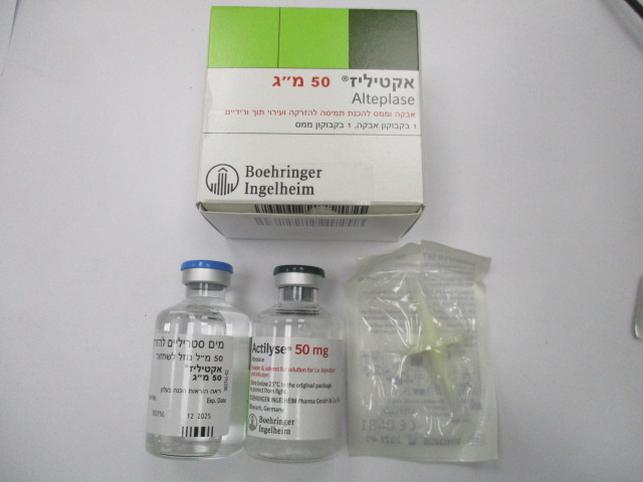Quest for the right Drug

אקטיליז 50 מ"ג ACTILYSE 50 MG (ALTEPLASE)
תרופה במרשם
תרופה בסל
נרקוטיקה
ציטוטוקסיקה
צורת מתן:
תוך-ורידי : I.V
צורת מינון:
אבקה וממס להכנת תמיסה להזרקהאינפוזיה : POWDER AND SOLVENT FOR SOLUTION FOR INJECTION/INFUSION
עלון לרופא
מינוניםPosology התוויות
Indications תופעות לוואי
Adverse reactions התוויות נגד
Contraindications אינטראקציות
Interactions מינון יתר
Overdose הריון/הנקה
Pregnancy & Lactation אוכלוסיות מיוחדות
Special populations תכונות פרמקולוגיות
Pharmacological properties מידע רוקחי
Pharmaceutical particulars אזהרת שימוש
Special Warning עלון לרופא
Physicians Leaflet
Adverse reactions : תופעות לוואי
4.8 Undesirable effects The most frequent adverse reaction associated with Actilyse is bleeding in different forms resulting in a fall in haematocrit and/or haemoglobin values. Adverse reactions listed below are classified according to frequency and system organ class. Frequency groupings are defined according to the following convention: Very common (≥1/10), Common (≥1/100 to <1/10), Uncommon (≥1/1,000 to <1/100), Rare (≥1/10,000 to <1/1,000), Very rare (<1/10,000), Not known (cannot be estimated from the available data). Except for intracerebral/intracranial haemorrhage as adverse reaction in the indication stroke as well as for reperfusion arrhythmias in the indication acute myocardial infarction, there is no medical reason to assume that the qualitative and quantitative adverse reaction profile of Actilyse in the indications acute massive pulmonary embolism and acute ischaemic stroke is different from the profile in the indication acute myocardial infarction. Table 1 Adverse reactions in acute myocardial infarction, acute massive pulmonary embolism and acute ischaemic stroke System Organ Class Adverse Reaction Haemorrhage very common intracerebral haemorrhage represents the major adverse reaction in the treatment of acute ischaemic stroke all haemorrhages including those in this table, e.g. ICH and non-ICH common intracerebral haemorrhage (such as cerebral haemorrhage, cerebral haematoma, haemorrhagic stroke, haemorrhagic transformation of stroke, intracranial haematoma, subarachnoid haemorrhage) in the treatment of acute myocardial infarction and acute massive pulmonary embolism pharyngeal haemorrhage gastrointestinal haemorrhage (such as gastric haemorrhage, gastric ulcer haemorrhage, rectal haemorrhage, haematemesis, melaena, mouth haemorrhage, gingival bleeding) ecchymosis urogenital haemorrhage (such as haematuria, haemorrhage urinary tract) injection site haemorrhage (puncture site haemorrhage, catheter site haematoma, catheter site haemorrhage) uncommon pulmonary haemorrhage (such as haemoptysis, hemothorax, respiratory tract haemorrhage) epistaxis ear haemorrhage rare eye haemorrhage pericardial haemorrhage retroperitoneal bleeding (such as retroperitoneal haematoma) not known*** bleeding in parenchymatous organs (such as hepatic haemorrhage) Actilyse Updated Prescribing Information 20 mg, 50 mg Feb 2023 Immune system disorders rare hypersensitivity reactions (e.g. rash, urticaria, bronchospasm, angio-oedema, hypotension, shock)* very rare serious anaphylaxis Nervous system disorders very rare events related to the nervous system (e.g. epileptic seizure, convulsion, aphasia, speech disorder, delirium, acute brain syndrome, agitation, confusion, depression, psychosis) often in association with concurrent ischaemic or haemorrhagic cerebrovascular events Cardiac disorders** very common recurrent ischaemia / angina pectoris, hypotension and heart failure / pulmonary oedema, common cardiogenic shock, cardiac arrest and reinfarction uncommon reperfusion arrhythmias (such as arrhythmia, extrasystoles, AV block first degree to atrioventricular block complete, atrial fibrillation / flutter, bradycardia, tachycardia, ventricular arrhythmia, ventricular tachycardia / fibrillation, electromechanical dissociation [EMD]) mitral regurgitation, pulmonary embolism, other systemic embolism / cerebral embolism, ventricular septal defect Vascular disorders rare Embolism which may lead to corresponding consequences in the organs concerned Gastrointestinal disorders rare nausea not known*** vomiting Investigations uncommon blood pressure decreased not known*** body temperature increased Injury and poisoning and procedural complications not known*** fat embolism (cholesterol crystal embolisation), which may lead to corresponding consequences in the organs concerned Surgical and medicinal procedures not known*** Blood transfusions (necessary) * See sections 4.4 and 4.5 **Cardiac disorders As with other thrombolytic agents, the events described above under the respective section have been reported as sequelae of myocardial infarction and / or thrombolytic administration. These cardiac events can be life- threatening and may lead to death. ***Frequency calculation This adverse reaction has been observed in post-marketing experience. With 95 % certainty, the frequency category is not greater than “rare”, but might be lower. Precise frequency estimation is not possible as the adverse drug reaction did not occur in a clinical trial database of 8299 patients. Death and permanent disability are reported in patients who have experienced stroke (including intracranial bleeding) and other serious bleeding episodes. Actilyse Updated Prescribing Information 20 mg, 50 mg Feb 2023 Reporting of suspected adverse reactions: Reporting suspected adverse reactions after authorisation of the medicinal product is important. It allows continued monitoring of the benefit/risk balance of the medicinal product. You can report side effects to the Ministry of Health by following the link ‘Reporting Side Effects of Drug Treatment' on the Ministry of Health home page (www.health.gov.il) which links to an online form for reporting side effects. You can also use this link: https://sideeffects.health.gov.il

שימוש לפי פנקס קופ''ח כללית 1994
לא צוין
תאריך הכללה מקורי בסל
לא צוין
הגבלות
לא צוין
מידע נוסף
